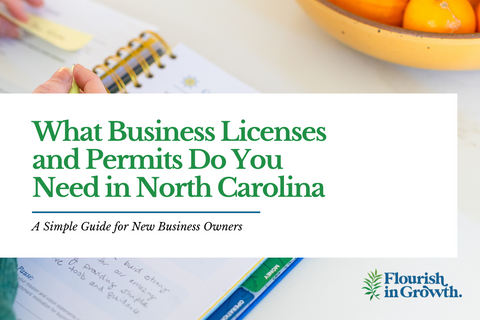What Business Licenses and Permits Do You Need in North Carolina? A Simple Guide for New Business Owners

Are you opening a new business in North Carolina?
If you are opening a new business in North Carolina, you are probably wondering what licenses or permits you need. In this breakdown, I’ll be focusing on resources available for starting a business in North Carolina and the exact steps that I would take if I were opening a new business. If you live in another state, you can use this as a general guide, but may have to do a little digging to find similar resources.
Because it can be confusing, let’s talk about the difference between licenses and permits first.
What is a business license?
A business license is a legal document that gives permission for your business to operate within a specific jurisdiction at a local, state, or sometimes federal level. Business license requirements are based on both where you live and your industry. Common examples of business licenses are for childcare centers, nail salons, and doctor’s offices.
What is a professional license?
A professional or occupational license is given to an individual to show they have received the necessary training and demonstrated their competency to perform a service in their industry. You likely already know if you are in a field that requires a professional license. Common examples include estheticians, electricians, barbers, EMTs, teachers, CPAs, doctors, and lawyers.
What is a business permit?
A business permit is given when the business passes an inspection that shows it is following federal and state laws. Permits can cover everything from occupancy to what is sold. Some common permits include: occupancy permits, food service permits, and alcohol permits.
Licenses and permits serve a similar purpose—to create standards that help protect the general public, employees, and the business itself. It is common for a business to need a business license, for its operators to hold a professional license, and for the business to have additional permits.
Here's an example:

What comes first?
First, register your business.
You’ll need a business entity before you apply for any licenses or permits, so you should first register your business with the Secretary of State of North Carolina.
Second, get your EIN Number.
Then you can request an EIN number from IRS.gov—this is a free and very simple process that typically takes around 15 minutes. If you are worried about the legal side, check out The Three Legal Mistakes Your Startup is Making and How They Can Impact Your Business, or talk to a local small business lawyer.
Now that you have a registered business entity and an EIN number, you can start the process of getting licenses and permits. I recommend working with an expert who understands what requirements are in place for the type of business you are opening. There are often small business liaisons to answer questions or guide the process within the permitting agencies. This is especially important for highly regulated industries. I’ve worked with business owners who have signed leases without knowing that they were required to make expensive changes to secure a permit. 0/10 I would not recommend!
When I started my business, I spent quite a bit of time consulting with several experts in the industry before I spent any money to create and print my product because I didn’t want any unexpected or expensive surprises. While it can feel like a tedious process, doing your research first should help create a smoother and faster process than trying to figure it out as you go.
Make a List
Imagine thinking that you can have a grand opening date that gets pushed back by two months because you didn’t know that you had to have a separate sink for handwashing. Before you sign a lease or set an opening date, make a list of all of the licenses and permits you need by following the steps below. Want to simplify the process? I made a free tracker that you can download below.
In North Carolina, there are over 700 licenses and permits for businesses. Because different organizations oversee different functions, you will likely have to work with multiple agencies to be fully legal to open. Here are the exact steps that I recommend you take to understand what licenses and permits you need to open your business in North Carolina.
-
Call EDPNC and ask them for help getting a full list of the licenses and permits you may need. There is no cost to consult their team of experts and EDPNC (Economic Development Partnership of North Carolina) does a fantastic job of helping business owners start to understand the license and permit requirements for opening a business in North Carolina.
-
This website lists all of the business and occupational licenses available in North Carolina along with the links to more information about those permits. Since each license or permit is listed individually, you’ll need to know all of the categories in which you should look for a permit or license, so don't depend on this website as a standalone.
- Call your local town office of economic development and tell them you are looking for help understanding what licenses and permits you may need. I’d also ask them specifically if they can recommend a business owner who already operates a similar business and who might be able to help you navigate the process.
- If you are going to lease a physical space, hire a realtor who has expertise in your industry. For example, if you are opening a restaurant, look for a realtor with extensive experience in the restaurant industry. Ideally, a commercial agent can alert you to potential challenges, like a code violation, or expensive updates to meet current requirements, before you sign a lease. Bonus: while they represent you, the owner of the property pays their fee, not you.
-
If you are in a regulated industry, call or visit the website of the state organization that oversees the licenses in your industry. In North Carolina, some of the most common are: salons, medical offices, childcare, or your county health department.
- Meet with your local Small Business Center and tell them you are trying to understand any regulatory requirements for licenses and permits for your business. Every community college in North Carolina has a Small Business Center and they are a free resource with many community connections.
The permitting and licensing process can feel a bit cumbersome at the outset, but the good thing is that there are a lot of resources and you don't have to do it alone. I like to frame tasks like this as a doable checklist instead of a dreaded inconvenience. Since I have to do it anyway, it feels more manageable when I treat it like a checklist.
Of course, I love a list! Here's a quick recap of each step of the process and I've linked a free tracker below that I made to help you stay organized throughout the process.
- Register your business with the North Carolina Secretary of State.
- Get your EIN number at IRS.gov.
- Call EDPNC and be ready to give them a list of products or services you plan to sell.
- Visit this website for a list of all business and occupational licenses in NC.
- Call your local economic development office to see if they can share any local regulatory requirements with you.
- Meet with your local Small Business Center and tell them you are trying to cover any regulatory requirements for your business.
- Hire a commercial realtor with expertise in your industry to help secure any needed physical space.
- Call or visit the website of your state or federal regulatory agency. They will often have a pre-application checklist that you can use to understand all of the requirements.
Want to track everything? I made you a free business permit and license tracker to record every permit or license you’ll need to open your business in North Carolina. Download it by entering your email here. 👇
Get My License and Permit Tracker
* indicates required
You May Also Enjoy
- How to Use a Small Business Planner to Set and Achieve Your Business Goals
- How to Become a Woman-Owned Certified Business
- How Can You Start A Business Without Money? Tips for Beginners
About Flourish In Growth
We help business owners navigate the ups and downs of building the business they want. Our rules are: Clear, simple, no-fluff, and actionable! Stop doubting yourself. Meet your small business map—The Guided Small Business Planner™. This is a workbook guide with step-by-step instructions for building a strong business foundation. It's not a calendar. It's a guided journal.








